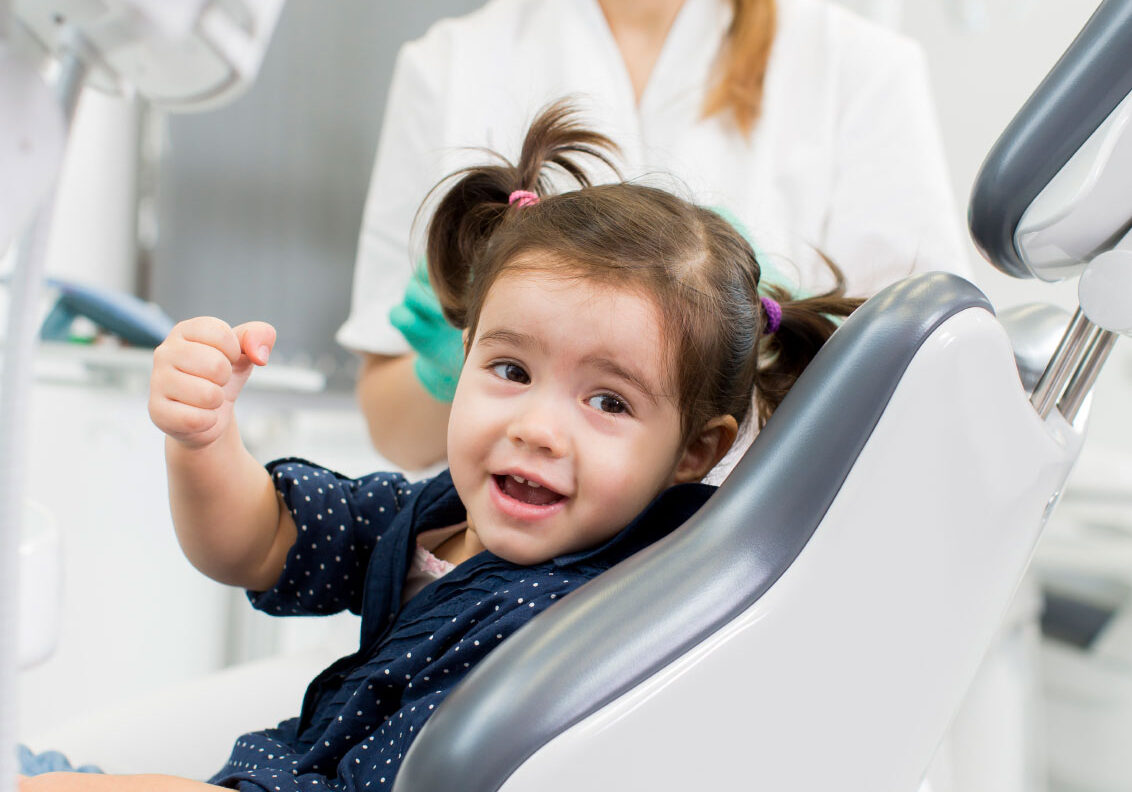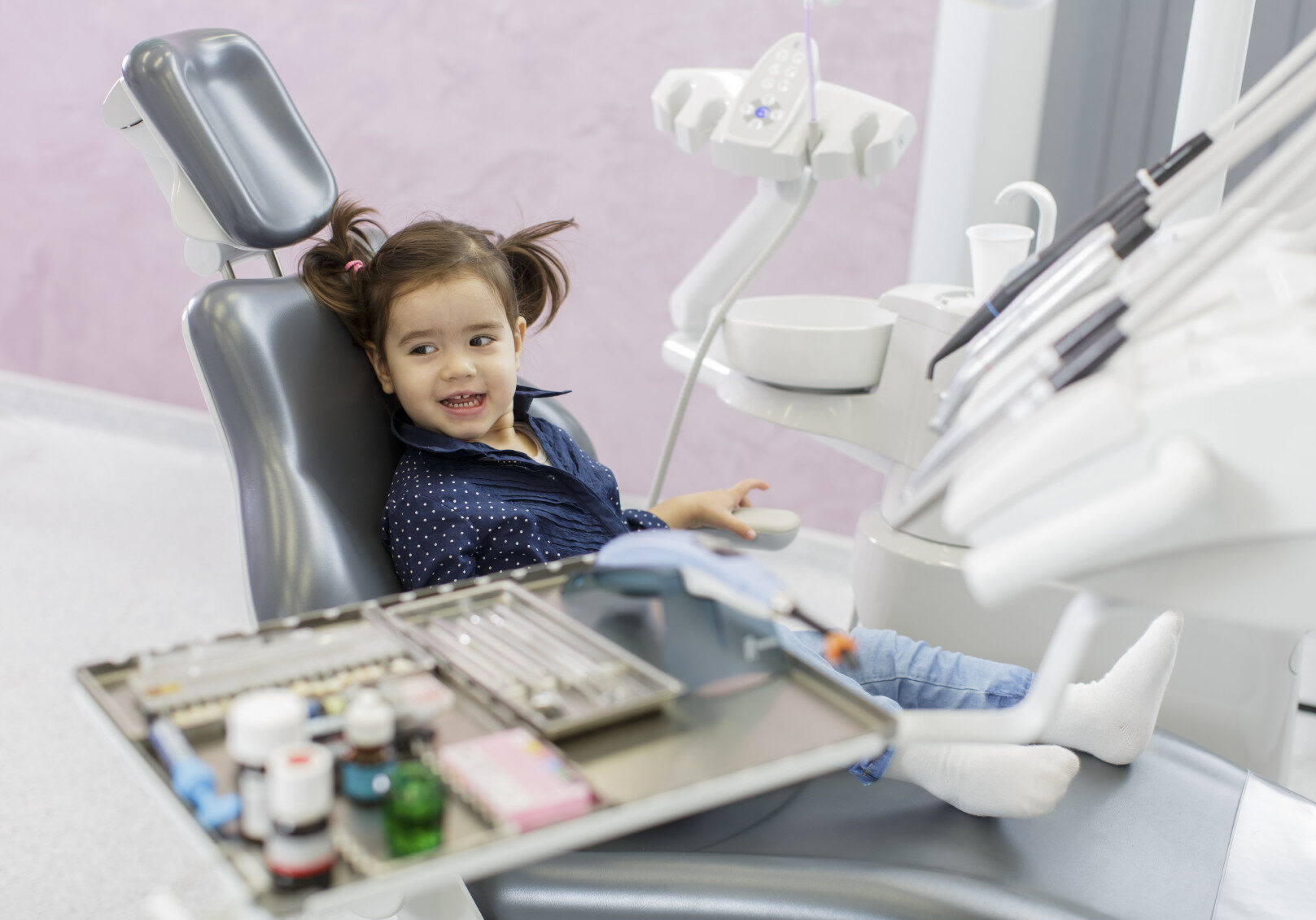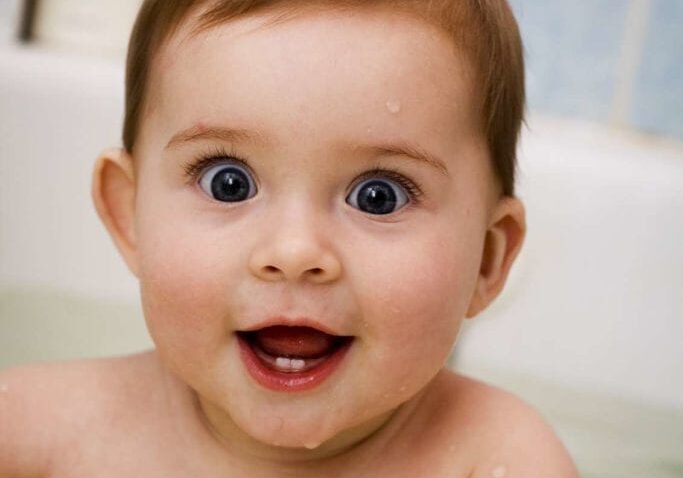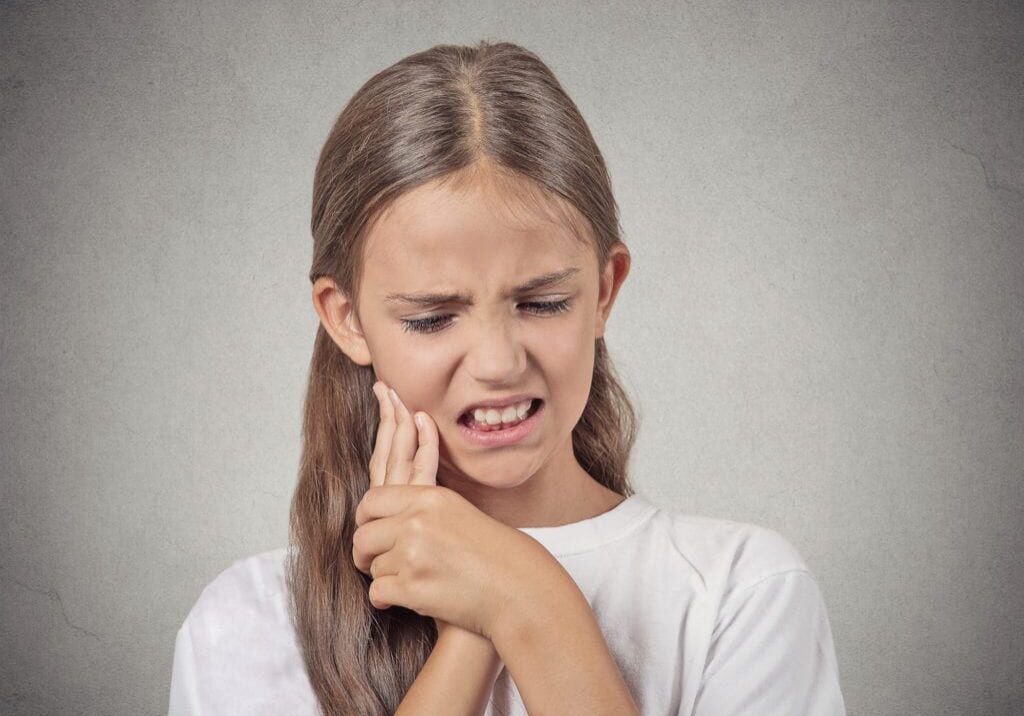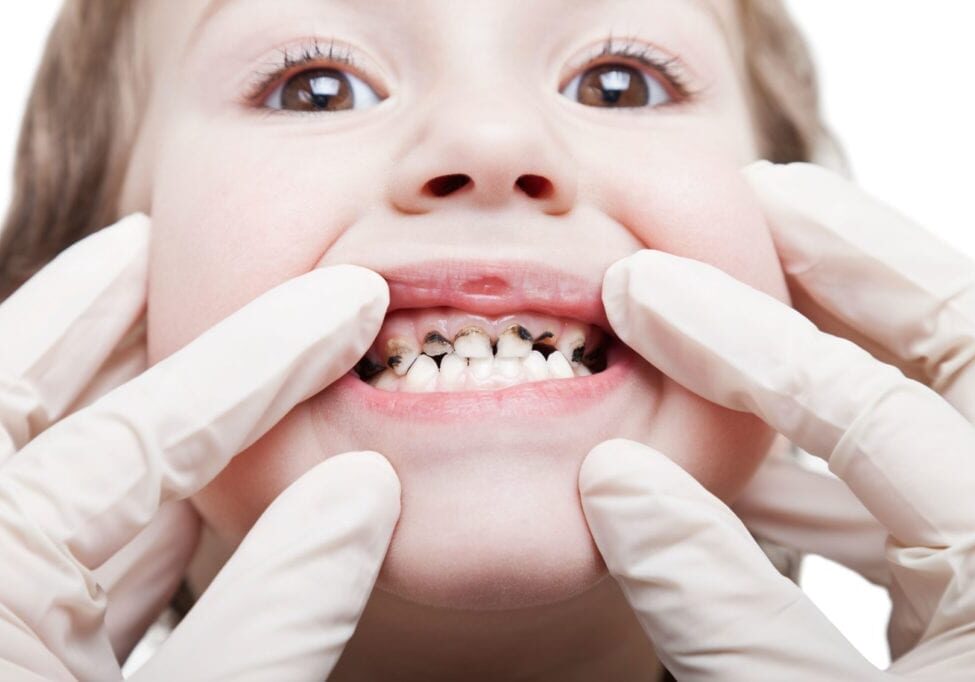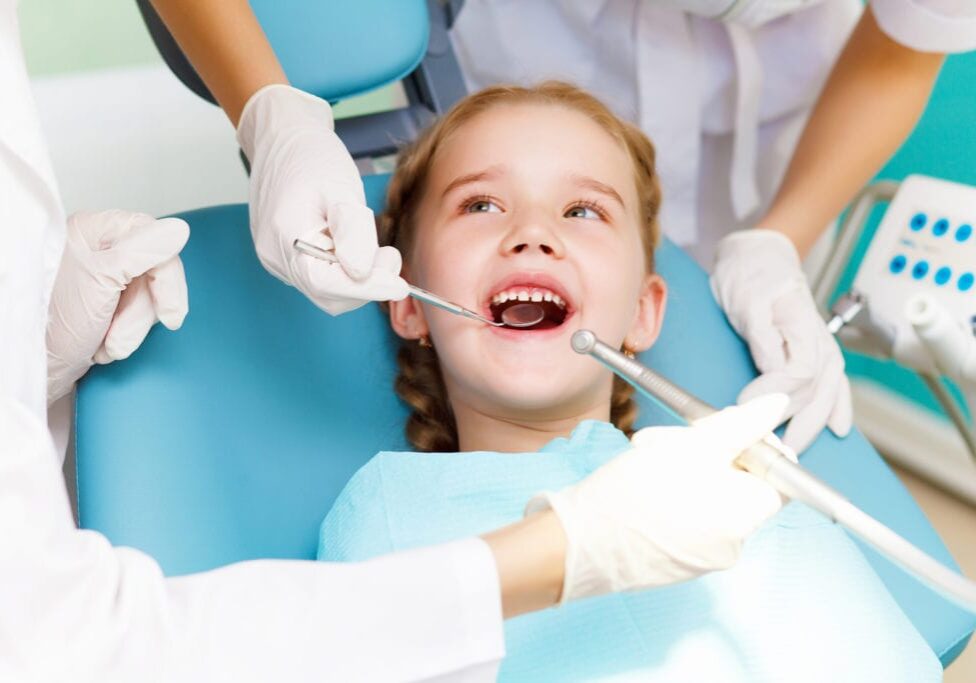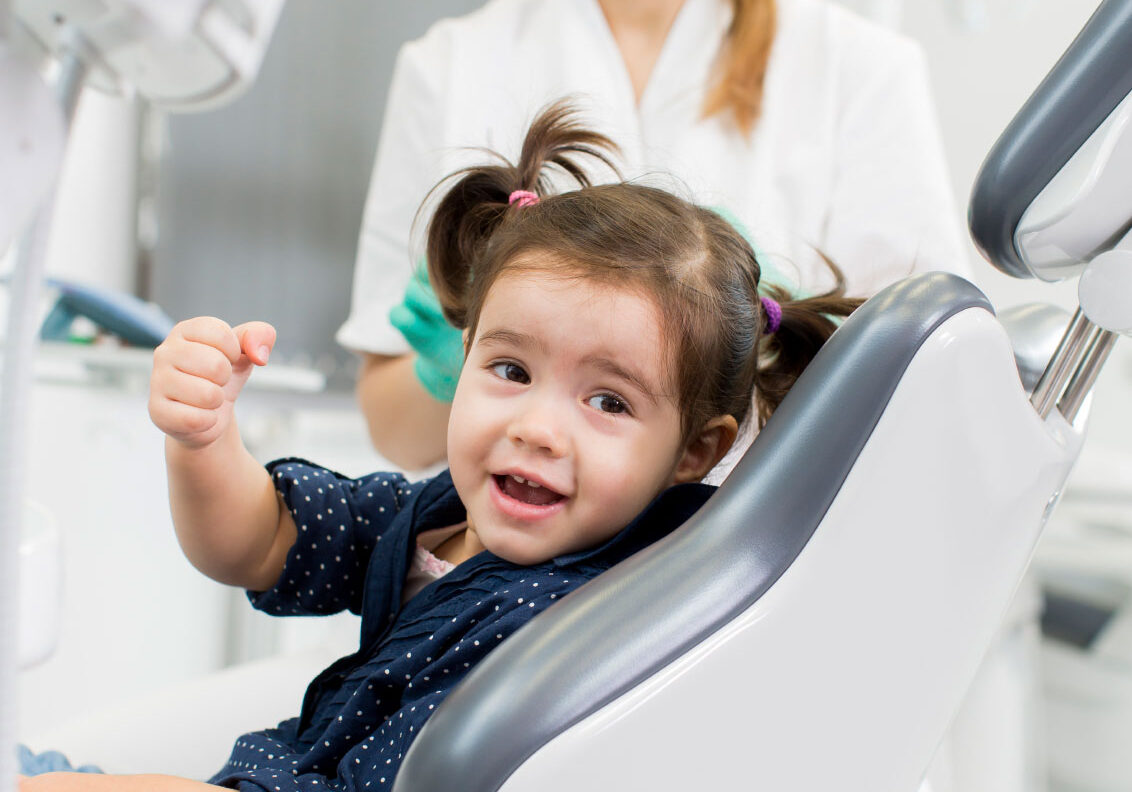The Complete Guide To Your Kid's Oral Health (2019 Edition)
This is the ultimate guide to your kid's oral health in 2019.
When do you take your kid to the dentist for the first time?
What should you be doing at home to keep their mouths happy and healthy?
How do you even pick a pediatric dentist?
We're going to answer all these questions and more.
So, let's dive right in.
The First Visit To The Dentist
Chapter 1
Your child's first visit to the dentist can be an exciting and anxious time.
You may be feeling thrilled to experience this big milestone with your little one.
But you may also be feeling a little anxious about the whole endeavour.
How will your baby react? How will YOU react? What will happen?
Read on to learn what to expect at your child's first dentist appointment.
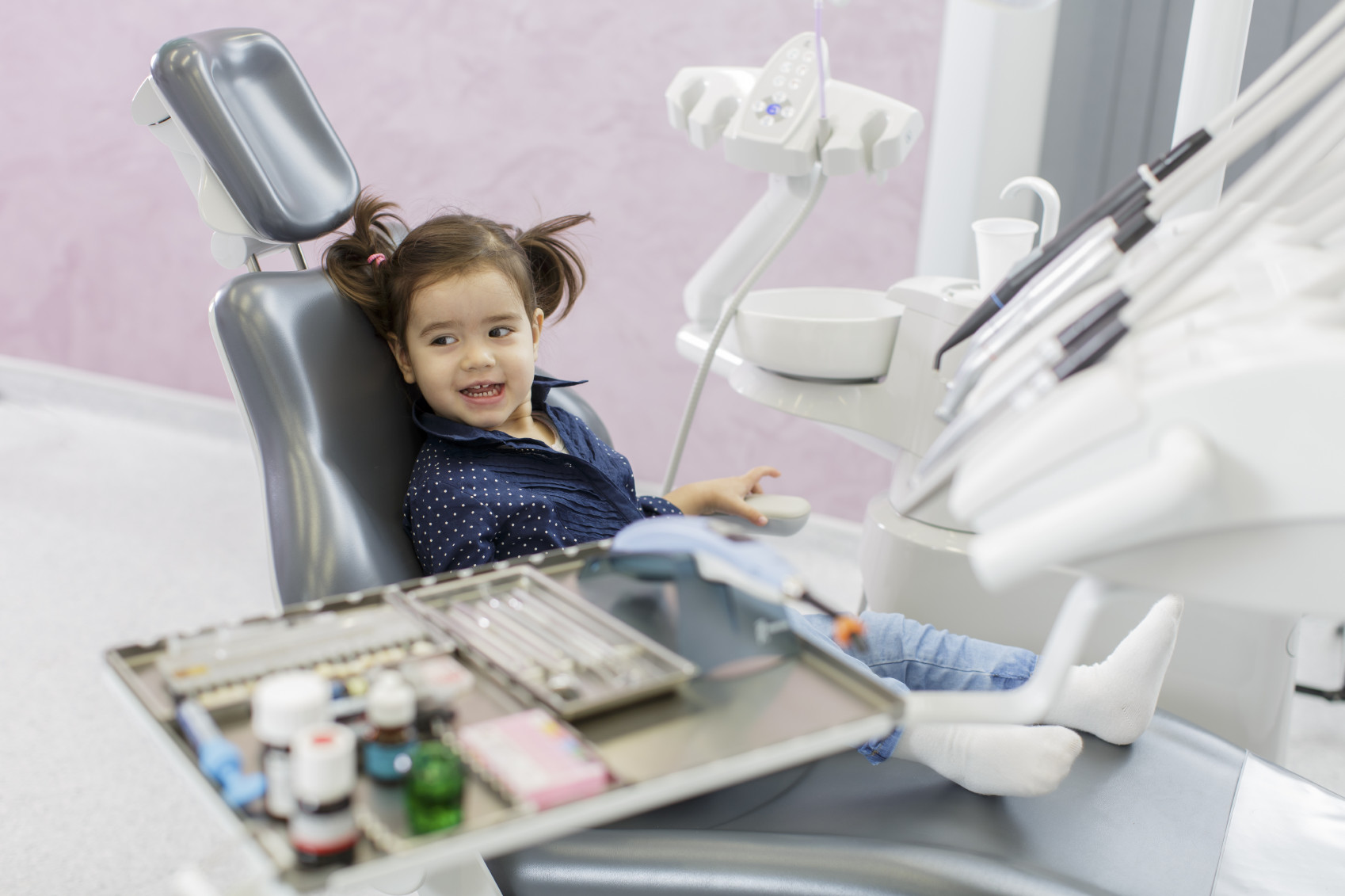
First Visit By Their First Birthday
The American Association of Pediatric Dentistry recommends children see their pediatric dentist by their first birthday. We agree with this recommendation.
In fact, a lot of dentists prefer to see your child around six months. This early visit enables them to identify any risk factors.
The First Visit Sets The Tone
It is very important to make the first visit as positive and enjoyable for the child as possible. A pleasant, comfortable first visit builds trust and helps put the child at ease during future dental visits. Your child should know that the doctors and staff will explain everything in detail and will answer any questions they have.
A pleasant, comfortable first visit builds trust and helps put the child at ease during future dental visits.
Parents should not make a big deal out of the visit and refrain from using any words that could cause unnecessary fear, such as “needle,” “shot” or “drill.”
The dentist and hygienist can explain treatment procedures in a positive and pleasant manner to avoid any anxious or negative feelings toward dentistry.
The age 1 visit is also for you – the parents!
You'll get oral hygiene information so you can properly care for your child’s smile.
The dentist may even speak with you about your oral hygiene habits, as these have been shown to have a significant impact on your child’s cavity risk.
Practicing proper oral hygiene daily can prevent costly dental work.
Separation Anxiety And How To Deal With It
Your pediatric dentist should be experienced in dealing with children with anxiety. It is common for children to have separation anxiety, so don’t be concerned or surprised if your child exhibits negative behavior. This behavior will soon diminish.
Studies indicate that the majority of children over age 3 respond more positively when they are allowed to experience the visit on their own and in an environment specially designed for them.
Typically, the dentist can establish a closer rapport with your child when you are not present in the treatment room. However, you should be welcome to accompany your child into the waiting room if you choose to. Children who are not receiving dental care should remain in the waiting area with an adult.
Brushing & Flossing For Kids
Chapter 2
Your child's good oral hygiene habits start at home.
That means they should be brushing and flossing at least twice a day, just like you.
You may be wondering, "Are there brushing special techniques for kids?".
Or maybe, "Do kids even need to floss anymore?".
We go over these questions and much more in this section on brushing and flossing for kids.

Teeth Brushing
Cavities form when plaque builds upon and in-between teeth, but regular brushing can prevent this build-up from happening. Your child should brush twice a day, every day to ensure clean and healthy teeth! Brushing teeth every day is a perfect way to practice preventive dental care.
Here’s how to get your kids started brushing (this probably sounds familiar to you):
- Place the toothbrush at a 45-degree angle to their teeth.
- Move the brush back and forth in short strokes.
- Brush the outer surface of the upper then lower teeth.
- Brush the inner surface of the upper then lower teeth.
- Brush the chewing surfaces.
- Brush the tongue for fresh breath
Your little ones should brush their teeth at last two times daily to avoid the accumulation of food particles and plaque:
- In the morning after breakfast
- At bedtime
As soon as the bristles start to wear down or fray, replace their toothbrush with a new one. Do not swallow any toothpaste; rinse your mouth thoroughly with water after you finish brushing. It is important to carefully floss and brush daily for optimal oral hygiene. Read on for tips on flossing.
Flossing
A lot of people are actually confused as to whether kids should floss or not. Is it even recommended?
Flossing is the exercise of removing food particles stuck in between teeth with the help of dental floss. It helps with cleansing the teeth of impurities and eventually cavities. This is necessary because not all food particles are cleaned out by brushing one’s teeth so extra care needs to be taken.
Is flossing for kids still important? Of course! Read on to check the guidelines set by the government, what the dentists have to say and how kids can be encouraged to floss on a regular basis.
Change in Government Flossing Guidelines
At the Office of Disease Prevention and Health Promotion within the U.S. Department of Health and Human Services the suggestion of regularly flossing in its dietary guidelines was removed.
Dentists do not give much weight to these guidelines as they claim flossing is “common sense”.
One doctor claimed that when having meat it gets between teeth and leaving it overnight can also fester and leave a boil next to your gums.
The bleeding caused by flossing is actually due to incorrect way of flossing or if the person has gingivitis.
Dentists Still Say "Floss"!
As children have weaker gums and teeth, doctors recommend them to reduce the frequency of flossing. Instead of once a day, a couple of times a day should suffice.
At the same time, care should be taken that no meaty bits remain stuck in their tiny white pearls.
If they are having meat on a daily basis and complain of bits stuck between their teeth or they complain of a toothache, parents should ensure that they either have it flossed out or a visit to the dentist would be due.
Tips to Get Kids to Floss
To encourage kids to floss, especially when they have food that tends to get between their teeth, parents should incentivize the whole exercise.
Set up a chart to keep track of your kid’s brushing and flossing. This reminds them to brush and floss and teaches them responsibility and self-motivation.
You can give them small rewards as incentives, like stickers every week, or even a new toy if they have a good month.
All About Teeth
Chapter 3
Everyone gets 2 sets of teeth in life: baby teeth and permanent teeth.
A lot of people wonder when their baby's teeth will start falling out or when permanent teeth will come in.
In this chapter, we review what you can expect when it comes to your kid's baby and permanent teeth.
And just for fun, we threw in some little-known facts about teeth!
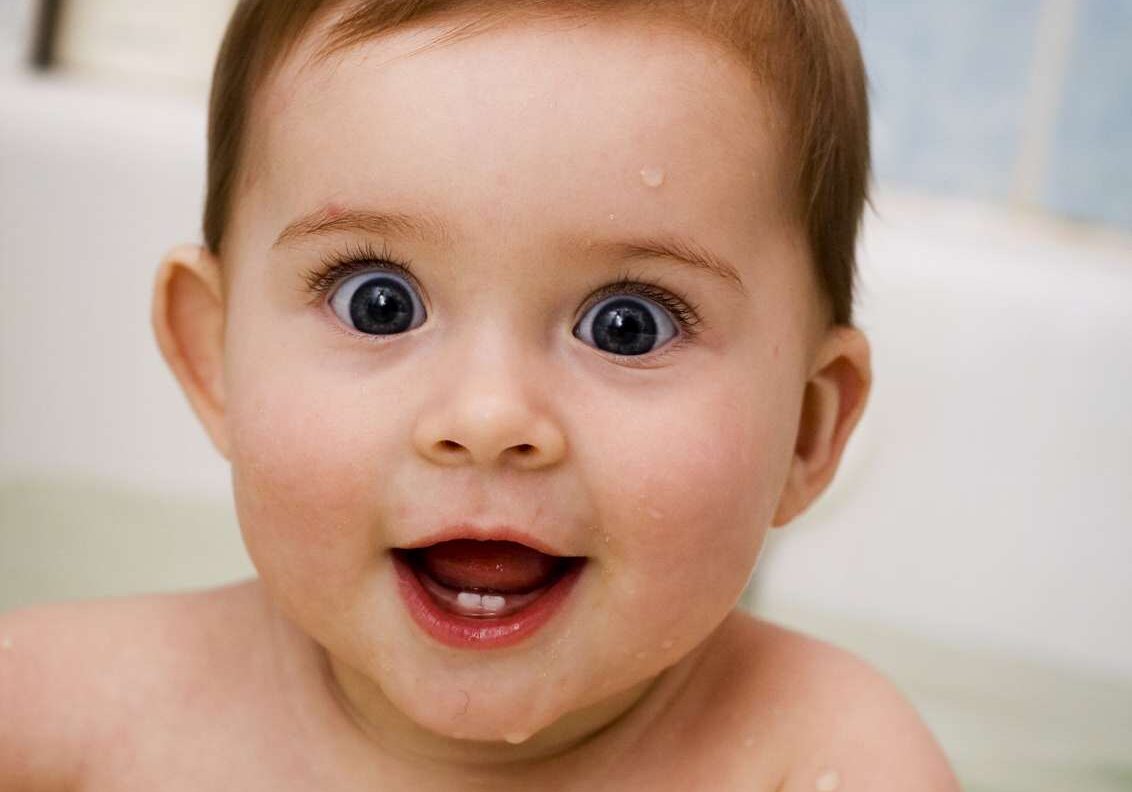
What is Tooth Eruption
The term “eruption” may sound alarming, but it simply means the process by which a child’s first teeth, also known as primary, baby or deciduous teeth, break through the gums and appear in the mouth.
Babies are born with most of these teeth already formed, so this is a completely natural and usually trouble-free process, though it often causes temporary discomfort.
The proper development of these baby teeth is important in helping young children start on solid food and in learning to speak.
When Should First Teeth Appear?
The timing of teeth eruption varies considerably. A first tooth may not be seen until as late as 15 months in some cases, but around six months of age is typical.
In most children, two lower front teeth are seen first, followed by four upper teeth. More teeth then gradually emerge during the next two years or so until a maximum of 20 is visible. Most children have this full set of baby teeth by the age of three and retain them until about 6 or 7 when they begin to be gradually replaced by permanent adult teeth.
What to Look For
A process lasting several years is naturally subject to wide individual variations, but certain things are commonly observed –
- girls’ teeth usually appear earlier than those of boys;
- lower teeth normally appear before the upper;
- teeth generally appear two at a time; and
- during the period when both baby and adult teeth are present, the baby teeth will be identifiable as smaller and whiter than the adult.
Permanent Teeth
Throughout your life, you will have two sets of teeth: primary (baby) teeth and secondary (permanent) teeth.
The primary teeth appear around ages 6-8 months, and all 20 are in place by age 3.
Permanent teeth will begin to grow around age 6, and with the exception of wisdom teeth, are all present between ages 12 and 14.
The next teeth to grow in are the 12-year molars and finally the wisdom teeth. Wisdom teeth typically begin breaking through from age 17 and on.
The total number of permanent teeth is 32, though few people have room for all 32 teeth, which is why wisdom teeth are usually removed.
Your front teeth are called incisors. The sharp “fang-like” teeth are canines. The next side teeth are referred to as pre-molars or bicuspids, and the back teeth are molars. Your permanent teeth are the ones you keep for life, so it is important that they are brushed and flossed regularly and that periodic check-ups by a dentist are followed.
Fun Facts About Teeth
Here are some fun facts about teeth that we bet you didn't know!
1. George Washington Had No Teeth
Did you know that our country’s first president George Washington lost most of his permanent teeth before he turned 21? He had to use dentures made of gold and brass throughout his adult life. George wasn’t a shining example of excellent oral hygiene, but you can be one by brushing your teeth twice a day and learning a few teeth facts to help you take care of your teeth.
2. Tooth enamel is the hardest bone in your body
Yes, it is. The enamel is the reason why teeth last forever. It also protects the inner part of the tooth called the dentin. To take care of your enamel, ensure you brush your teeth often and avoid biting into hard objects.
3. Your mouth makes around 25,000 gallons of saliva in a lifetime
Incredible, isn’t it? 25,000 gallons is equal to the amount of water in a standard Olympic size swimming pool. Saliva also has vital minerals that protect the enamel and prevent tooth decay.
4. Teeth started growing in your gum before you were born
Baby teeth started forming in your gum way before you were born. This explains the itchy gum kids have before the first tooth sprouts. Kids have 20 baby teeth while adults have 32 permanent teeth.
5. Your mouth has more bacteria than there are people in the world
This is true, but it shouldn’t scare you. Keep on brushing your teeth often, especially after meals, and you will be good to go.
6. Everyone’s teeth are different
Teeth are like fingerprints; no two people in the world can claim to have identical teeth. This explains why teeth are crucial in identifying people, especially during an investigation.
Dental Emergencies Kids Face
Chapter 4
Emergencies happen.
Teeth get broken or fall out.
Tounges get bitten.
Don't panic!
We'll review some common emergencies kids face and what to do about them.
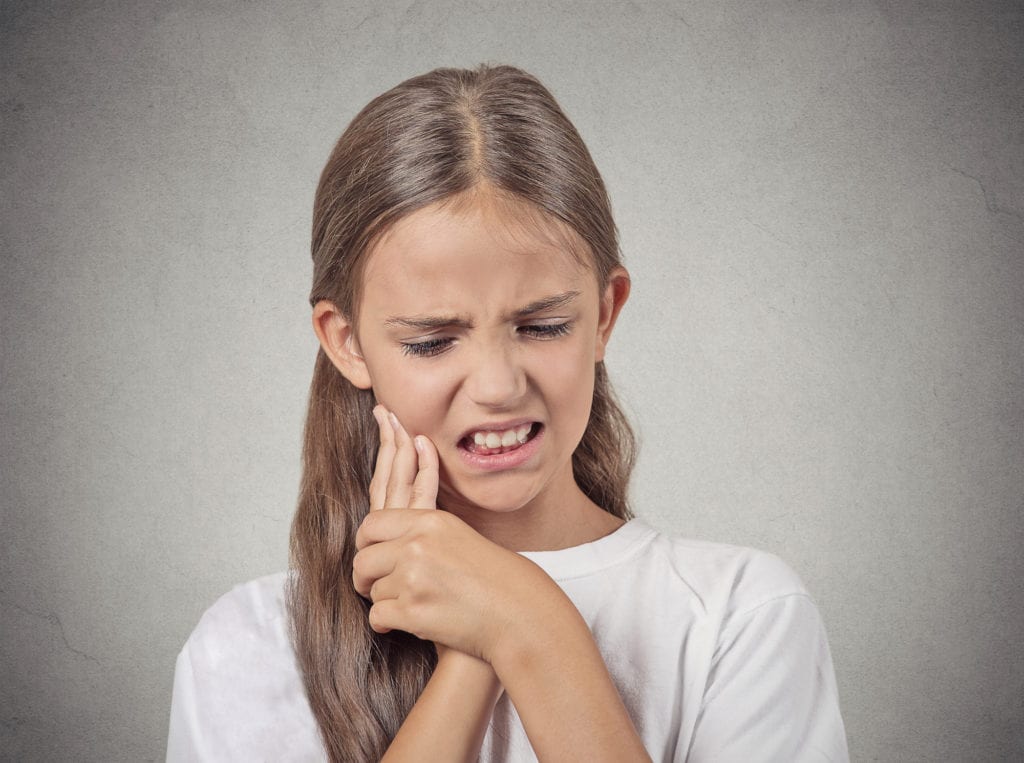
Tooth Ache
Begin by cleaning around the sore tooth meticulously. Using warm salt water, rinse the mouth to displace any food trapped between teeth. UNDER NO CIRCUMSTANCES should you use aspirin on the aching tooth or on the gum. In the event of facial swelling, apply a cold compress to the area. For temporary pain relief, acetaminophen is recommended. See a dentist as soon as possible.
Cut or Bitten Tongue, Lip or Cheek
Ice can be applied to any bruised areas. For bleeding, apply firm (but gentle) pressure with sterile gauze or a clean cloth. If the bleeding does not stop with pressure or continues after 15 minutes, go to an emergency room.
Broken Tooth
Rinse the area with warm water. Put a cold compress over the facial area of the injury. Recover any broken tooth fragments. Get immediate dental attention.
Possible Broken Jaw
In the event of jaw injury, tie the mouth closed with a towel, tie or handkerchief. Go immediately to an emergency room.
Knocked Out Permanent Tooth
Recover the tooth, making sure to hold it by the crown (top) and not the root end. Rinse, but do not clean or handle the tooth more than necessary. Reinsert the tooth in the socket and hold it in place using a clean piece of gauze or cloth. If the tooth cannot be reinserted, carry it in a cup containing milk or water. Because time is essential, see a dentist immediately.
Bleeding After a Baby Tooth Falls Out
Fold a piece of gauze and place it (tightly) over the bleeding area. Bite down on the gauze for 15 minutes; if bleeding continues, see a dentist.
Cold or Canker Sores
Over-the-counter medications will usually provide temporary relief. If sores persist, visit your dentist.
Common Problems
Chapter 5
Nobody's perfect. Especially kids!
There are some common problems that a lot of children face when it comes to their dental health.
Tooth decay.
Sensitive teeth.
Gum disease.
There are just a few of the problems your kid may face but fear not! These are all treatable by a trained pediatric dentist.
Let's get started.
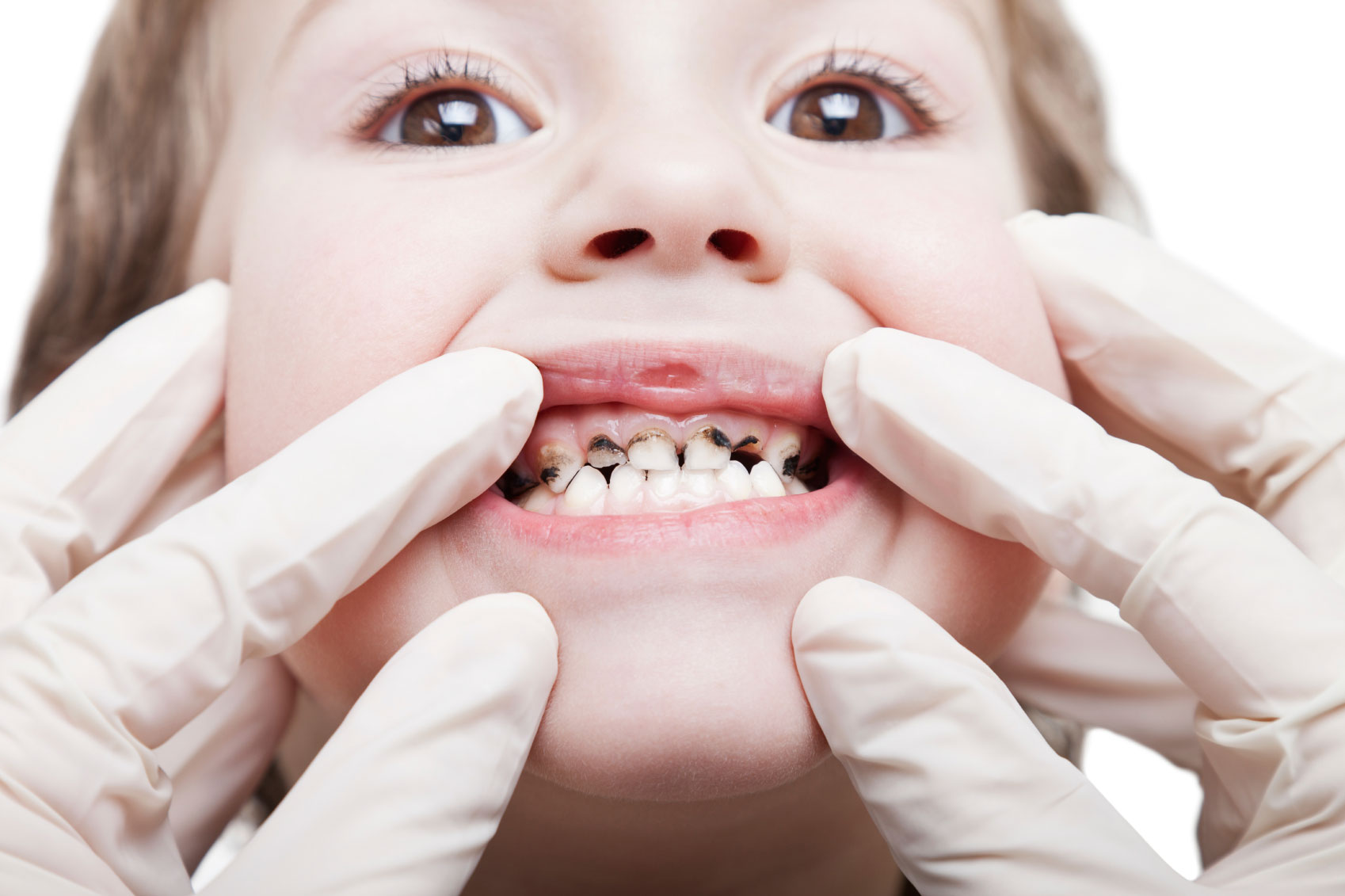
Tooth Decay
Caries, or tooth decay, is a preventable disease. While caries might not endanger your life, it may negatively impact your quality of life.
When your teeth and gums are consistently exposed to large amounts of starches and sugars, acids may form that begin to eat away at tooth enamel. Carbohydrate-rich foods such as candy, cookies, soft drinks, and even fruit juices leave deposits on your teeth. Those deposits bond with the bacteria that normally survive in your mouth and form plaque.
The combination of deposits and plaque forms acids that can damage the mineral structure of teeth, with tooth decay resulting.
Sensitive Teeth
Your teeth expand and contract in reaction to changes in temperature. Hot and cold food and beverages can cause pain or irritation to people with sensitive teeth. Over time, tooth enamel can be worn down, gums may recede or teeth may develop microscopic cracks, exposing the interior of the tooth and irritating nerve endings. Just breathing cold air can be painful for those with extremely sensitive teeth.
Gum Disease
Gum, or periodontal, disease can cause inflammation, tooth loss, and bone damage. Gum disease begins with a sticky film of bacteria called plaque. Gums in the early stage of disease, or gingivitis, can bleed easily and become red and swollen. As the disease progresses to periodontitis, teeth may fall out or need to be removed by a dentist. Gum disease is highly preventable and can usually be avoided by daily brushing and flossing. One indicator of gum disease is consistent bad breath or a bad taste in the mouth.
Canker Sores
Canker sores (aphthous ulcers) are small sores inside the mouth that often recur. Generally lasting one or two weeks, the duration of canker sores can be reduced by the use of antimicrobial mouthwashes or topical agents. The canker sore has a white or gray base surrounded by a red border.
Orthodontic Problems
A bite that does not meet properly (a malocclusion) can be inherited, or some types may be acquired. Some causes of malocclusion include missing or extra teeth, crowded teeth or misaligned jaws. Accidents or developmental issues, such as finger or thumb sucking over an extended period of time, may cause malocclusions.
Finding A Pediatric Dentist
Chapter 6
At this point, you probably realize you need to take your kid to the dentist.
But how should you go about finding the right one?
We'll go over some tips on finding a pediatric dentist for your child.
And if you're in the Dumfries, VA area, we'd love to have you in for a consultation.
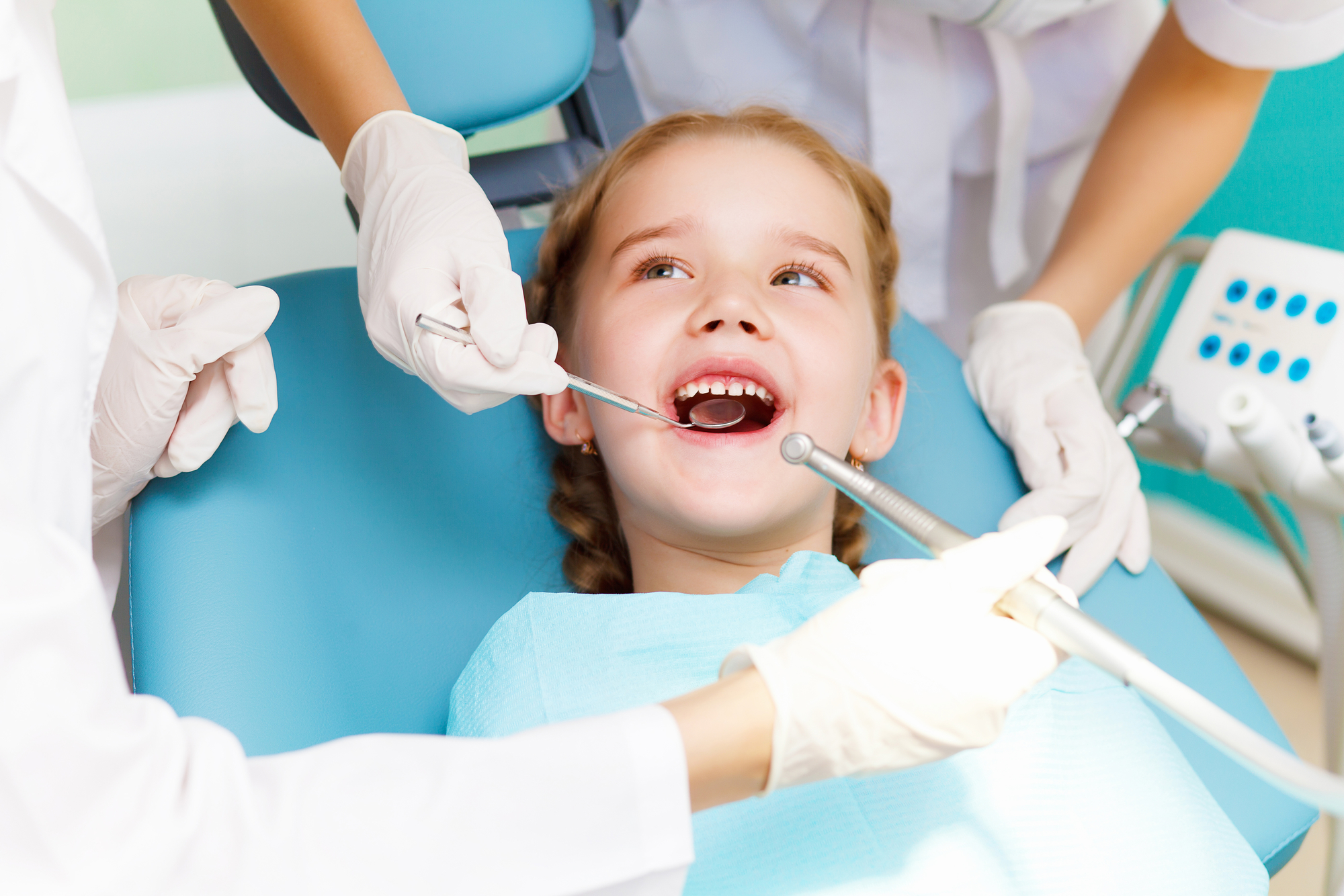
How To Choose A Pediatric Dentist
Just like pediatricians, pediatric dentists are specially trained to care for the specific dentistry needs of infants and children. However, the process of choosing a pediatric dentist can be stressful. It’s recommended that you be careful with the dentist you select so that you can be sure it'll be a good match for your kid's personality. Below are some tips to guide you in choosing the right pediatric dentist.
Check out for Qualification and Necessary Certification
This is the first and most important thing you should consider when looking for a pediatric dentist. Make sure that the specialist you settle on to care for your child's oral health is qualified and accredited. He/she should have to undertake professional training in pediatric dentistry from a recognized institution and should have a practice license.
Ask for Recommendations from Your Friends or Family Members
Your friends and family members who have children can be aware of good pediatric dentists that can take care of your kid. Take your time and ask some of them if they have a specific dentist that they can recommend. You can also ask for a referral from your pediatrician.
Consider the Location
You should also consider the travel distance between you and the dentist. Try working with a dentist who is not far away from your neighborhood for convenience. You can always prepare your child psychologically prior the actual day and time of the appointment using the dental clinic as the visual cue. Avoid longer distances since they tend to extend your child's anxiety.
Compile a List of Your Expectations
It is also good to come up with your basis for dentist evaluation to make the selection process easy. For instance, ask yourself the following questions and answer them before you even begin your search;
- Do you want a pediatric dentist who is located near your home, work, or your child’s school?
- Is your kid comfortable with male or female professionals?
- Does your kid have any dental anxiety?
Benefits of A Pediatric Dentist
You may be wondering why you should take your child to a pediatric dentist instead of your normal dentist.
There are a number of benefits to taking your child to a pediatric dental office, but we have listed three great reasons below!
#1: Trained Specifically for Children
A pediatric dentist receives training beyond a regular dentist that focuses on the unique factors involved in caring for children’s teeth. This training goes beyond knowledge of children’s teeth, and teaches pediatric dentists how to make sure children are not afraid and have fantastic trips to their office.
#2: Experience in All Stage of Teeth Development
As a child grows older, their teeth go through various stages, from baby teeth growing in and falling out, to their permanent teeth growing in.
A pediatric dentist has expertise in all these stages and will be able to help your child through each one. They will ensure that your child has the proper dental care and education on how to keep their teeth healthy so that they can develop a perfect smile.
#3: Kid-Friendly Office
A pediatric dentist's office is designed to make sure that your child is comfortable and relaxed with going to the dentist. They will have a friendly staff whose main goal is to make sure your child always likes going to the dentist.
Frequently Asked Questions
Chapter 7
You've just about reached the end of our guide on kid's oral health.
We're hoping most of your questions have been answered.
But just in case you still have a few more, we've included all of our most frequently asked questions below.
Feel free to give us a call or shoot us an email if you still have some lingering questions. Even if you're outside of Dumfries, we'd be happy to help.
